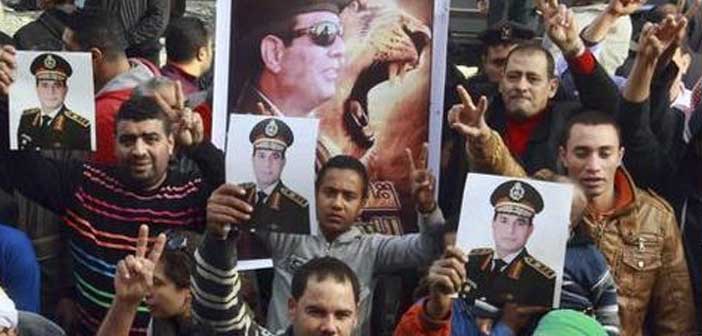Egyptians have voted on a new constitution, in a ballot widely seen as a referendum on the army’s decision to overthrow former President Mohamed Morsi in July last year. The vote was largely peaceful, but at least 11 people were killed and 28 people wounded across the country during clashes between anti-coup protesters and police, according to the health ministry.
Shortly before polls opened, there was a small explosion outside the courthouse in Imbaba, a neighbourhood on the west bank of Cairo. Nobody was injured in the blast, which police said was caused by a bomb left in a bag outside the court. The violence highlighted the government’s precarious grip on the most populous Arab nation, still reeling from Morsi’s ouster and a bloody crackdown on his supporters.
The charter is almost certain to be approved: Every referendum in Egypt’s modern history has passed by a comfortable margin, and not a single influential political group is pushing a “no” vote. At one polling station for women, dozens queued to cast their ballots, some waving Egyptian flags and chanting pro-military slogans.
“We must be with our police and army so that no one can terrorise us. Even if a bomb exploded in my polling station, I would vote,” said Salwa Abdel Fattah, a 50-year-old gynaecologist. In interviews at a half-dozen polling stations across Cairo on Tuesday, not a single voter said they opposed the constitution.
Only a few voters said they would endorse the charter because of specific provisions; instead, most wanted to show their support for General Abdel Fattah el-Sisi, the popular defence minister who led Morsi’s ouster on July 3. “He will unite the nation,” said Umm Mostafa, a housewife in Agouza, a working-class district. “Muslims, Christians, we all drink from the Nile. We need a strong man to protect the nation and end the strife.”
The atmosphere at many polling stations was festive, with women dancing and loudspeakers playing Teslam el-Ayadi, a pro-army song that has become popular since the military-orchestrated coup. Sisi himself made an appearance at one polling station in the Heliopolis neighbourhood of the capital, Cairo, where he was received with cheers and kisses.
“Work hard. We need the referendum to be completely secured,” he told soldiers guarding the school. Hisham Farid, a businessman leaving his polling station in Mohandiseen said: “Enough. After the last three years, enough. The nation can’t continue like this.”
“We need a government that can work on security and the economy. This constitution is good, it is civilian, it is for all Egyptians, not just for the Brotherhood.” Less than an hour later, dozens of voters were lined up at a polling station around the corner, all of them planning to vote “yes”. However, an Islamist coalition led by the former president’s Muslim Brotherhood had urged protests and a boycott of the two-day vote.
Voting will continue on Wednesday, and the electoral commission has said results would be finalised within 72 hours. A strong showing could impel Sisi to run for president in elections scheduled for later this year. He said on Saturday that he would consider running “at the request of the people and with a mandate from my army”.
About one-third of Egyptians turned out in 2012 to vote for a constitution drafted during Morsi’s presidency, and it was approved by a 64 percent margin. “Do not embarrass me in front of the world,” Sisi said, urging voters to participate, according to remarks carried by the state-run Al-Ahram newspaper. “Not me personally, but the army, because we in the army have the heart of one man.”
Turnout was modest throughout the morning, with queues of a few dozen voters at polling stations across Cairo. Judges at several polling stations said unofficially that between 25 and 40 percent of registered voters turned out on Tuesday, but those numbers are hardly a representative sample.
It is too early to say whether this year’s constitution will win more votes than Morsi’s did. “Why should I vote? We’ve had so many elections since the revolution… I’m tired of politics,” said Mohamed Nasr, a fruit-and-vegetable vendor. “The army removed Morsi six months ago, and until now nothing has changed.” AL JAZEERA






 WhatsApp us
WhatsApp us 

